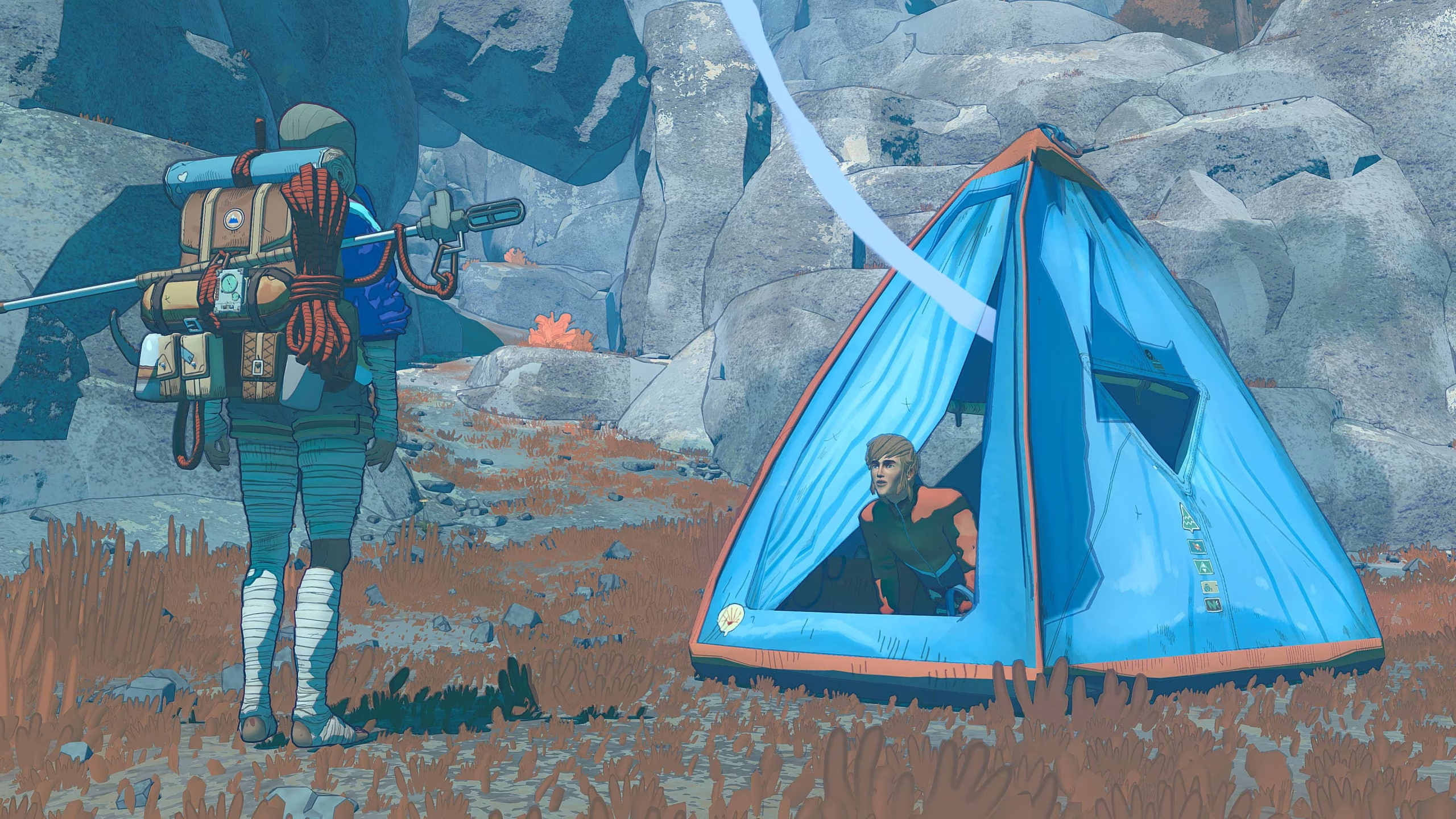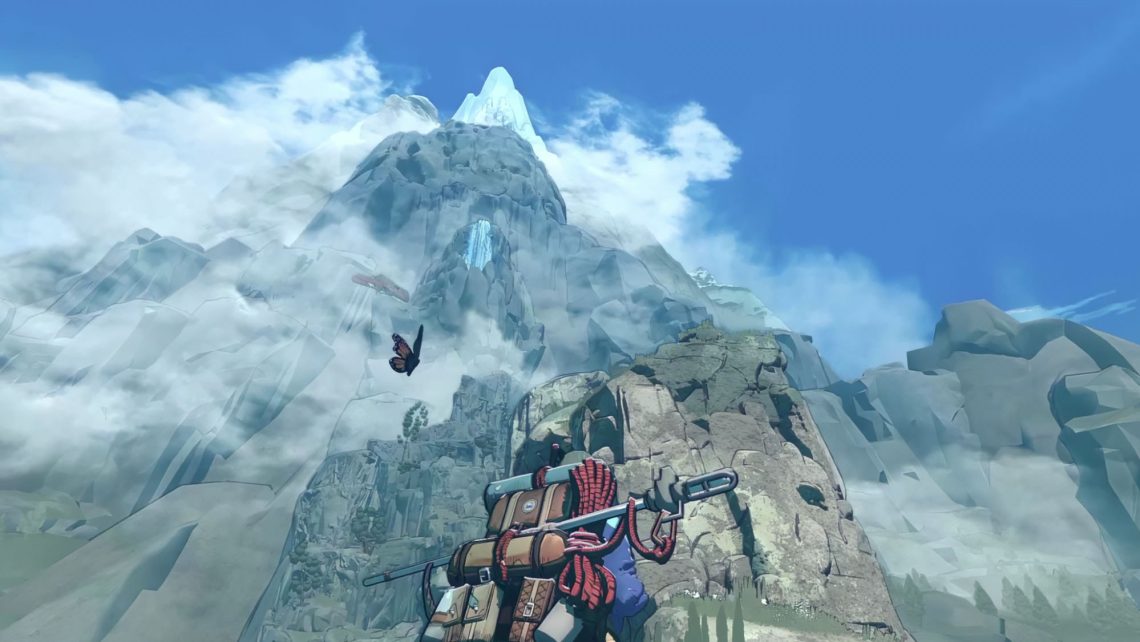My right leg has begun trembling. The rockface stretches beyond the vertical horizon. I can’t even see the summit. I reach for a handhold tantalizingly close. Too much. My right leg gives way. I fall down into the abyss. Until, that is, I come to a sharp stop halfway down. The rope digs into my side as I attempt to catch my breath. I latch onto the most recent belay point and slowly recover. I scrounge a chocolate bar from the depths of my rucksack and bite down. That same rockface stretches out before me once more. I start climbing.

Practice makes sort-of perfect
The Game Bakers’ CAIRN is a peculiar mix of new and existing ideas. A stamina-based rock-climbing simulator punctuated by light survival-crafting. You play as Aava: a celebrity climbing extraordinaire finally taking on the fictional peaks of Mount Kami. While perusing some in-game magazine articles and bulletin notices, it’s clear that no-one has yet conquered Kami. Enter Aava. The demo begins in the practice gym tucked underneath the base of Mount Kami, giving me a chance to try out the climbing system before beginning my ascent. Manual control of Aava’s limbs cycle through the right hand, left hand, left foot and right foot and each must be placed strategically to provide Aava enough leverage to reach the next stretch of rock. Without an explicit stamina meter, players must rely on visual cues to measure fatigue. Shaking limbs and heavy breathing usually foreshadow a nasty fall unless the player can maneuver into a more comfortable standing position. I will admit that placing a given appendage can sometimes be a touch finicky – feet will often attach to the side of rocks instead of balancing on top – resulting in an unnecessary loss of stamina as you reach for the next handhold. It’s an issue that becomes even clearer once I’ve left the gym. However, the inclusion of an undo button ensures this never graduates into an outright frustration. I conquer seven of the eight training walls and set off, rucksack in tow.
Mount Kami appears over the horizon as I emerge from the practice gym, its snowy peaks forcing themselves through the cloud line. A winding pathway, bordered by grass and flowers, stretches from the gym to the first climb. I start hiking. The opening hours of my trek will take me across this initial walk-up: short climbs interjected by stretches of hiking and scrambling before the ascent starts in earnest. CAIRN looks stunning, frankly, considering the size of its development team. The lightly cel-shaded art style, reminiscent of critically acclaimed puzzler Blue Prince, pairs wonderfully with the natural flora and striking vistas. It gives the entire setting a wonderfully hand-drawn feel while also granting otherwise uniform rockfaces a high degree of readability that more than once helped me find a last-minute foothold. Frame rate drops do become more noticeable the further I progress in the demo, often to a distracting degree. CAIRN doesn’t exactly require twitch reflexes – and the dropped frames could simply be an unfortunate feature of an earlier demo build – but this kind of instability is nonetheless a concerning detail this close to launch.

Never take anything for granite
My first proper climb goes fairly smoothly. Aava carries a limited number of pitons (small metal spikes acting as anchor points) that she can drill into the rockface to varying degrees of success. In gameplay, pitons basically operate as checkpoints that make higher-altitude errors far less frustrating and costly. My climbot takes a piton and readies itself against the rockface. Damn it. My unevenly drilled spike will leave Aava with nothing but metal scraps with which to fashion fresh pitons at the next save point. The presence of the piton in both crafting and resource management, as well as the inclusion of a timing-based mini-game, makes the item additive to the game loop as opposed to the hollow checkpoint spam into which these systems so often devolve.
I finally summit the rockface and my trusty climbot collects the rope and piton scraps below. The climbot is a miniature robotic companion that also automatically belays, drills pitons, and identifies previous climbing routes. Less clunky than a human companion and better suited to the extreme terrain, the climbot neatly fits into Aava’s arsenal. Now on smoother ground, I find a tiny outcrop overlooking the valley and set up my first bivouac: an aerodynamic tent in which climbers will fix broken pitons, craft new climbing gear, and cook new snack items that provide short-lived buffs to stamina, grip strength and focus. A little too short-lived for my taste: more often than not my buffs were half-spent by the time I had resumed climbing. Reaching into my rucksack for snacks while my stamina dwindled didn’t fare much better. I settle down for the night to restore my health and stamina. I set my alarm for first light.

There’s summit about this game…
The next day. Night approaches as I tackle the final section of my climb, my right leg still trembling. I switch on climbot’s flashlight and assess my options. Looking at my previous routes, every failed attempt has come as a result of taking a left at the overhang. This time I take a right. I stretch around the jutting stone and push myself on top. Climbot drills another piton, perfectly level this time. A few more handholds and a few more footholds and I roll onto the summit, exhausted. And that’s it: Aava looks up to the rest of Mount Kami and continues hiking. I’ll have to wait until next year to continue my expedition. There are definitely a few kinks to smooth out but CAIRN nonetheless looks to be an accomplished and challenging climbing sim supported by robust crafting and resource management systems. It’s visually striking, mechanically thoughtful, and deeply satisfying. And most crucially, I’m eager to reach the summit. What else can you say?
CAIRN launches in Q1 2026 for PS5 and PC. Stay tuned to Smash Jump for our full review.








